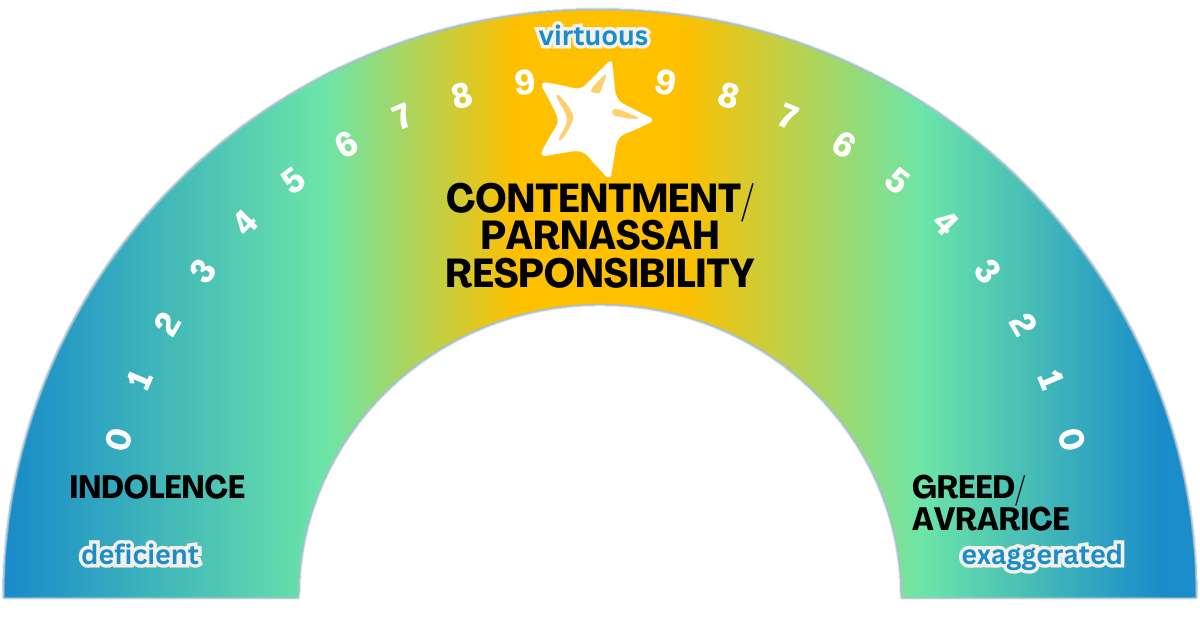We all need money to live, which makes the pursuit of wealth a significant influence on our daily decisions and interactions. Each of us has unique mindsets and habits when it comes to earning a livelihood and acquiring material possessions. In this section, we’ll delve into the character traits and attitudes that shape our approach to making a living.
The Continuum
Along the continuum of financial pursuit, individuals can fall at various points. On one extreme is indolence, characterized by a lack of effort or ambition in seeking financial stability. On the other extreme is greed/avarice, marked by an insatiable desire for wealth and material gain. The virtuous path lies in the center, where individuals find contentment in their current circumstances while responsibly managing their resources to ensure a respectable livelihood.
People may find themselves at various positions on this continuum. To make things even more complex, some may shift their position based on the circumstance. For instance, while some individuals may refrain from asking for a salary raise, they may demonstrate initiative and boldness by actively engaging in fundraising efforts for causes they support.
Indolence: At this extreme of the continuum, individuals display a lack of interest or effort in managing their finances, often neglecting opportunities for improvement and growth.
Over-Cautious Deliberation: Progressing, there are individuals who have an excessively cautious approach to financial decision-making; they overthink and deliberate to the point of paralysis, which hampers progress and leads to missed opportunities for growth.
Contentment/Parnassah Responsibility: As the median, individuals find satisfaction and fulfillment in what they have, striking a balance between desires for more and a sense of gratitude for their current circumstances. They prioritize responsible management of their parnassah, ensuring they live respectably by diligently maintaining integrity in their pursuit of livelihood and managing their resources.
Materialism: Advancing along the spectrum, individuals become increasingly focused on the accumulation of wealth and possessions, prioritizing material gain over other aspects of life and often measuring success by monetary standards.
Greed/Avarice: At the extreme end of the continuum, individuals are consumed by insatiable desires for more money and possessions, often at the expense of ethical considerations and personal well-being.
Benefits of Contentment/ Parnassah Responsibility
When we embrace a balanced approach between indolence and avarice in our pursuit of wealth, we not only find contentment in our current circumstances but also strive for responsible management of our resources, leading to a respectable livelihood.
Here are some benefits:
Clarity and calmer mind. Contentment fosters a calm mind, enhancing your ability to make sound decisions and strategize effectively for parnassah. With reduced mental clutter and anxiety, you can approach work with greater mindfulness, aligning actions with preferred schedules, goals, and aspirations. This clarity of thought optimizes productivity, fosters creativity, and increases the likelihood of achieving success in your professional endeavors.
Inner Peace. Embracing contentment cultivates a sense of inner peace and tranquility, reducing stress and anxiety associated with constant striving and perpetual dissatisfaction, thus enabling you to navigate life’s ups and downs with greater resilience and equanimity.
Enhanced Quality of Life. Ultimately, living with contentment allows you to savor life’s simple pleasures, appreciate the beauty of everyday moments, and lead a more fulfilling and meaningful existence.
Harmony at Home. Choosing contentment over the relentless pursuit of wealth can carve out more time and mental space for your family. Prioritizing fulfillment over constant accumulation allows for meaningful investments in shared experiences and connections with loved ones. This balance between financial security and family well-being enriches life, fostering a calmer, more harmonious home environment. With less stress all around, stemming from a healthy blend of financial stability and meaningful relationships, everyone benefits from a more fulfilling and contented life.



